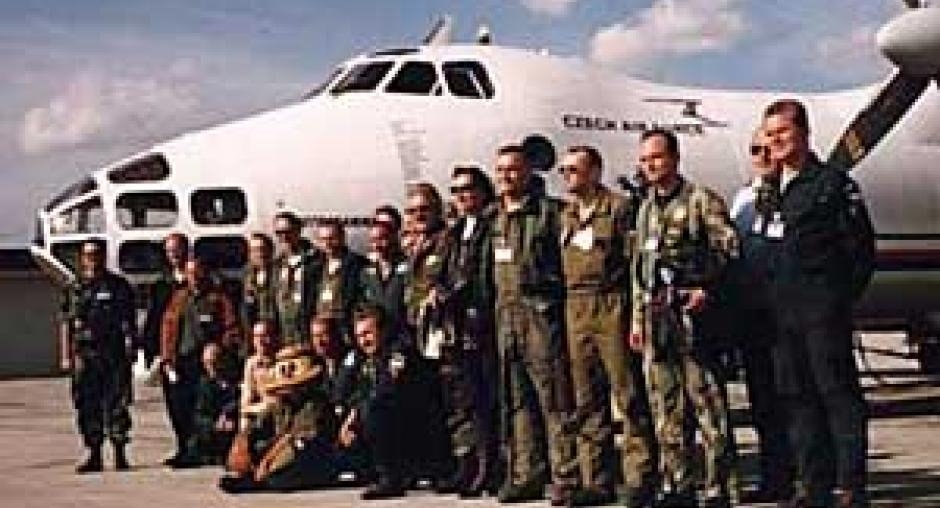Newsroom
All conditions fulfilled for Open Skies Treaty to enter into force
VIENNA 5 November 2001

(OSCE)Participants from both of the Armed Forces in Bosnia and
Herzegovina take part in aerial observation flights as part of the
Regional Arms Control Agreements measures to promote greater
openness and transparency of military activities. (OSCE) Photo details
VIENNA, 5 November 2001 (OSCE) - The Governments of the Depository nations Canada and Hungary have announced that the Russian Federation and the Republic of Belarus have deposited their instruments of ratification of the Treaty on Open Skies with them on 2 November. The announcement was made today during a meeting of the Open Skies Consultative Commission in Vienna today. The Open Skies Treaty will enter into force 60 days after the deposit of the instruments, on 1 January 2002.
"Within its area of application from Vancouver to Vladivostok, the Open Skies Treaty constitutes a unique tool of transparency", said Jean-Luc Faure-Tournaire, the current Chairman of the Open Skies Consultative Commission.
Signed in Helsinki on 24 March 1992, the Treaty establishes a regime of open flights by the 27 States Parties for military observation. This provides for unprecedented openness, by allowing States Parties to overfly each others' territory with an observation aircraft. Open Skies observation flights can also be used for conflict prevention and crisis management, and even for many other purposes such as the protection of the environment.
The flights are carried out with unarmed aircraft, equipped with specific sensors and flying according to a flight plan defined by the observing State and accepted by the observed State. The data resulting from these flights are made available to all States Parties to the Treaty.
Between 1996 and 2001, more than 350 trial missions took place. A total of 29 flights were carried out in the first half of 2001 alone. This intense activity has shown the undiminished interest of States Parties for the Open Skies Treaty and prepared them for its full implementation.
During the six months following entry into force of the Treaty, any other OSCE participating State may apply for accession by submitting a written request to one of the Depositories. Subsequently, the Open Skies Consultative Commission will consider the application of any State interested in participating in the Treaty. Finland and Sweden announced today their intention to accede to the Treaty.
"Within its area of application from Vancouver to Vladivostok, the Open Skies Treaty constitutes a unique tool of transparency", said Jean-Luc Faure-Tournaire, the current Chairman of the Open Skies Consultative Commission.
Signed in Helsinki on 24 March 1992, the Treaty establishes a regime of open flights by the 27 States Parties for military observation. This provides for unprecedented openness, by allowing States Parties to overfly each others' territory with an observation aircraft. Open Skies observation flights can also be used for conflict prevention and crisis management, and even for many other purposes such as the protection of the environment.
The flights are carried out with unarmed aircraft, equipped with specific sensors and flying according to a flight plan defined by the observing State and accepted by the observed State. The data resulting from these flights are made available to all States Parties to the Treaty.
Between 1996 and 2001, more than 350 trial missions took place. A total of 29 flights were carried out in the first half of 2001 alone. This intense activity has shown the undiminished interest of States Parties for the Open Skies Treaty and prepared them for its full implementation.
During the six months following entry into force of the Treaty, any other OSCE participating State may apply for accession by submitting a written request to one of the Depositories. Subsequently, the Open Skies Consultative Commission will consider the application of any State interested in participating in the Treaty. Finland and Sweden announced today their intention to accede to the Treaty.
